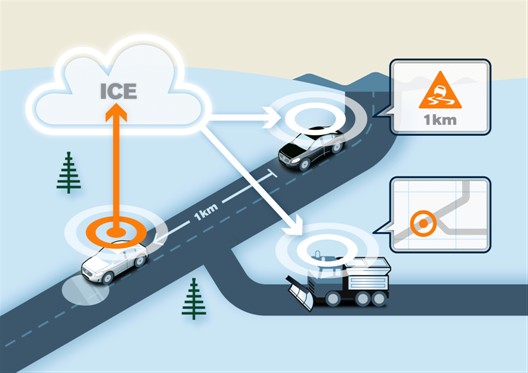Volvo Car Group, the Swedish Transport Administration (Trafikverket) and the Norwegian Public Roads Administration (Statens Vegvesen) are initiating a pilot project that will send road condition information from individual vehicles to a cloud-based system to improve public safety, the organisations said Wednesday.
March 19, 2014

Volvo Car Group, the Swedish Transport Administration (Trafikverket) and the Norwegian Public Roads Administration (Statens Vegvesen) are initiating a pilot project that will send road condition information from individual vehicles to a cloud-based system to improve public safety, the organisations said Wednesday.
“The pilot is one of the first practical examples of the way communication between vehicles over the mobile network enables vehicles to ‘speak’ to each other and with the traffic environment. This can contribute to making traffic safer,” said Erik Israelsson, project leader, co-operative intelligent transport system at Volvo.
“Our aim is to make the technology available for our customers within a few years,” he added.
The system works by sending real-time data about road friction to the cloud-based platform so that it can automatically alert other nearby vehicles about slippery patches and poor road conditions.
When a car detects an icy or slippery road patch, the information is transmitted to Volvo Cars’ database via the mobile network. A warning is then automatically transmitted to other vehicles that are approaching the slippery area, making it possible for the drivers to take action to avoid road hazards.
The Broadband World Forum is taking place on the 21st – 23rd October 2014 at the RAI Exhibition and Convention Centre, Amsterdam. Click here to download a brochure for the event.
The application in the vehicle will be designed to adapt the driver warning to match the severity level based on the vehicle speed and the present road conditions.
The company said it has 50 test cars on the roads, and plans to grow its fleet “considerably” by the coming winter season.
Volvo has previously focused on developing its connected car platform largely for infotainment purposes,teaming up with Ericsson on its foundational connected car technology platform, and inking agreements with over the top service providers like Pandora and Spotify to help make the vehicle a central hub of entertainment and connectivity.
This is the first time the vehicle manufacturer is linking built-in vehicle sensors to its cloud database in a bid to make both driving and road maintenance safer.
“When the road administrator has access to information from a large number of cars, the data can be used to make winter road maintenance more efficient. The information could help to improve road safety further for all road users. This could also reduce the use of salt when not needed and minimise the environmental impact,” Israelsson said.
“The strategic focus on connectivity within our new scalable product architecture paves the way for more cloud-based safety solutions. This will bring us closer to our safety vision that nobody should die or suffer serious injuries in a new Volvo car by the year 2020,” he concluded.
About the Author(s)
You May Also Like








.png?width=300&auto=webp&quality=80&disable=upscale)


_1.jpg?width=300&auto=webp&quality=80&disable=upscale)


.png?width=800&auto=webp&quality=80&disable=upscale)